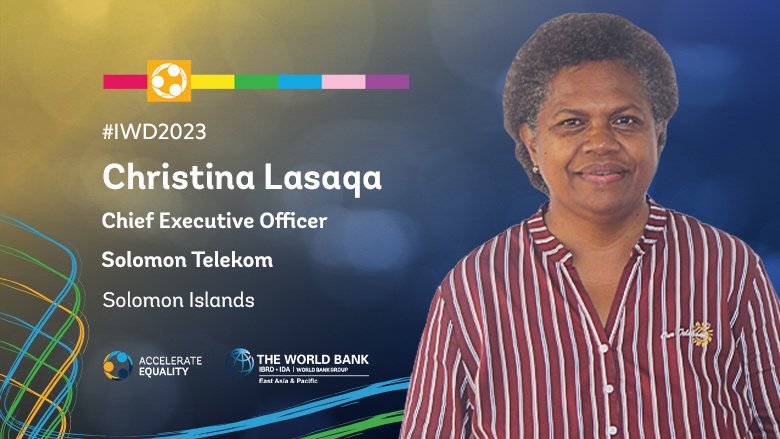Christina Lasaqa is CEO of Solomon Telekom; the first woman to serve in the role. Having worked in the Solomon Islands telecommunications industry for two decades, Christina encourages her colleagues to pursue their goals with ambition, confidence, and responsibility.
What inspired you to work in telecommunications?
It was about learning new technologies. That's an inspiration I got from coming into a career in the telecommunication industry. I wanted to know more about how new technologies can change lives.
I've been here for almost 20 years now. I came in as an assistant manager in sales, marketing, and operations, just working with all males for a start. During those days, most of the managers were male, and many have been my mentors up to now and during my career at Solomon Telekom. I then became one of the first local managers during my time as well. I'm glad that I also encouraged other women that were there for many years to go for promotions.
This year’s UN theme for International Women’s Day is ‘DigitALL: Innovation and technology for gender equality.’ How can digital technology and innovation deliver greater gender equality?
Like everybody would appreciate, information and education is paramount to a society, and providing access to the various available technologies. That will certainly close the gap in terms of having more access to information. With an informed or educated society, that will change the whole world in driving gender equality.
What does your profession mean to you?
With Solomon Telekom, it's about providing telecommunication services to each Solomon Islander. The company's vision is to provide affordable and more internet access to all Solomon Islanders wherever they require it and this will enable people to have more access to information. Thus, my profession means more commitment, integrity, and accountability in delivering such services.
In your various roles, how have you seen equality evolve in your field?
It has changed over the years. As I mentioned earlier, with an educated society nowadays, you will see more women or girls in schools. Having more educated women in a society changes the culture of recognizing women in workplaces in a society, changing the mentality to see that, of course, women are just like men: we are all equal under God’s grace.
What were some of the challenges you faced as a leader, and what did you learn from them?
You would appreciate that for Melanesian countries, having a local female leader contrasts with some of the cultural beliefs in society. You have to build that trust in them - the confidence you can achieve, similar to what your male colleagues can do.
It is also about providing guidance and support to whichever team you work with, leading them towards your shared goals and the overall strategic priorities of the organization or whatever society you are in. It's about building up confidence in them and showing them as a role model that you can succeed in whatever leadership organization roles you may have.
What are some of the key ingredients to succeeding in the telecommunications sector?
From personal experience, obtaining the appropriate education and qualifications, having experience in the industry, and being goal oriented. Those are the key ingredients in working in the industry and growing your confidence in doing things along the way.
What are some memorable projects or mentors you've encountered in your career?
We introduced the electronic top-up system when we introduced mobile services many years ago. It was one of my responsibilities to oversee this introduction in the commercial area. My former CEO, who was a local, played a role in inspiring me to introduce new services to improve people’s technology experiences.
What do you think needs to be done to ensure more women are in leadership roles?
More education opportunities in these specific roles. We already have this formal education for our girls and women. I can see that. And in other places, I think it's more efficient policies that will support gender equality and diversity in the organization. With more inclusion policies in the workplace it may help women to succeed in their careers and profession.
What advice would you give Pacific women still studying or early in their careers?
For those studying, education is the key to success. Make use of that opportunity, and don’t take it for granted. Get your education, get your qualification, and chase your dreams. I think being patient is important for those in your early careers. Do your job, be diligent, and build your superiors' and peers' trust. Commit to your job, and set goals so that you can actually see progress as you go along. If you set goals, that will allow you to move forward and be successful.
**The views expressed in this interview do not necessarily represent the views of the World Bank Group.

